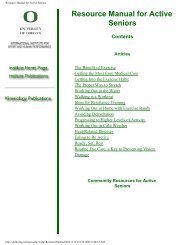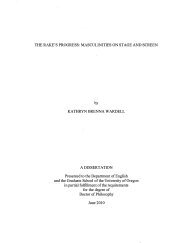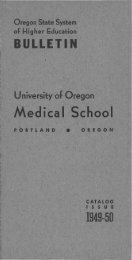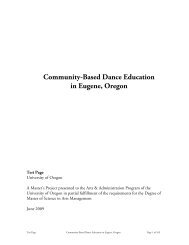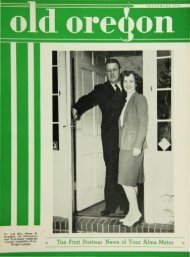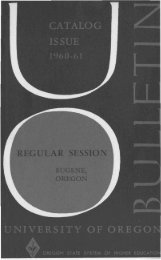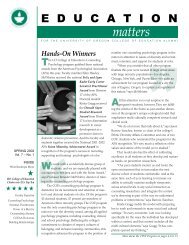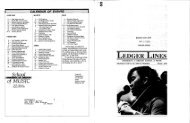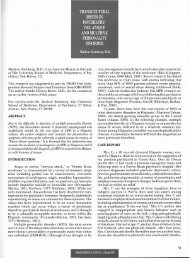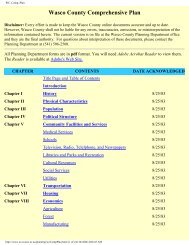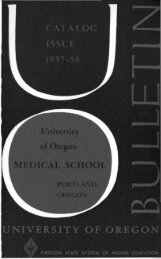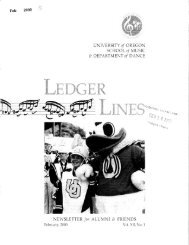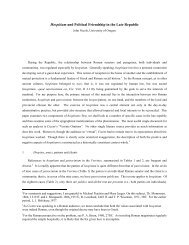~EGULAR SESSION - University of Oregon
~EGULAR SESSION - University of Oregon
~EGULAR SESSION - University of Oregon
Create successful ePaper yourself
Turn your PDF publications into a flip-book with our unique Google optimized e-Paper software.
338 PROFESSIONAL SCHOOLS<br />
bois and terminology, some knowledge <strong>of</strong> the piano keyboard, considerable pr<strong>of</strong>iciency<br />
if' performance, and as wide an acquaintance as possible with great music.<br />
During registration week, all new students are given auditions to determine<br />
their eligibility for private performance studies and examinations in basic musical<br />
grammer and keyboard knowledge to test their aptitude and readiness for introductory<br />
theoretical studies (information concerning these examinations may be<br />
obtained from the School <strong>of</strong> Music <strong>of</strong>fice). Exceptionally well-prepared and gifted<br />
students may be granted advanced placement or exemption from certain introductory<br />
studies on the basis <strong>of</strong> the examinations.<br />
Becanse the upper-division program is planned in continuity with basic courses<br />
taken during the first two years, students planning to major in music at the <strong>University</strong><br />
<strong>of</strong> <strong>Oregon</strong> are strongly advised to enter the <strong>University</strong> as freshmen. Students<br />
transferring from other institutions with prepr<strong>of</strong>essional preparation differing<br />
from the <strong>University</strong> pattern may, however, be admitted to the pr<strong>of</strong>essional<br />
curriculum if they show satisfactory pr<strong>of</strong>iciency by examination.<br />
The pr<strong>of</strong>iciency examinations are required <strong>of</strong> all students, including transfers<br />
and students who have taken their lower-division work at the <strong>University</strong>, before<br />
admission to upper-division major programs (information concerning these examinations<br />
may be obtained from the School <strong>of</strong> Music <strong>of</strong>fice).<br />
Facilities. The School <strong>of</strong> Music is housed in a building complex designed for<br />
instruction, practice, and performance-including an auditorium seating 600 persons,<br />
rehearsal rooms, studio-<strong>of</strong>fices, classrooms, and more than fifty practice<br />
rooms. The school's equipment includes a two-manual Wittmayer concert harpsichord,<br />
a two-manual Schlicker organ, a four-manual Reuter organ, and a number<br />
<strong>of</strong> Steinway grand pianos. The <strong>University</strong> Theater in Villard Hall provides<br />
facilities for operas and other stage productions.<br />
The music holdings <strong>of</strong> the <strong>University</strong> Library include a large collection <strong>of</strong><br />
scores, complete critical editions <strong>of</strong> the works <strong>of</strong> the great composers, standard<br />
reference works, and extensive collections <strong>of</strong> periodicals, recordings, and books<br />
on music. The music collection is supported by gifts from Phi Beta and Mu Phi<br />
Epsilon and a bequest from the late Matthew H. Douglas, former Universit)<br />
librarian. Through acquisitions under the Farmington Plan, the Library has a<br />
particularly strong and growing collection <strong>of</strong> contemporary foreign books on music.<br />
Musical Organizations. The <strong>University</strong> Symphony Orchestra, the <strong>University</strong><br />
Singers, the <strong>University</strong> Chorale, <strong>University</strong> bands, and the Opera Vvorkshop<br />
<strong>of</strong>fer membership and performance opportunities to all qualified students. Collegium<br />
Musicum, a vocal-instrumental group, provides opportunity for the study<br />
<strong>of</strong> mediaeval, Renaissance, and baroque music. The work <strong>of</strong> these organizations is<br />
planned to complement the theoretical and historical courses <strong>of</strong>fered by the school.<br />
Concerts and Recitals. Frequent concerts and recitals are presented on the<br />
campus throughout the year, by visiting artists, members <strong>of</strong> the faculty <strong>of</strong> the<br />
School <strong>of</strong> IvIusic, and advanced music students. Regularly scheduled concerts<br />
include performances by artists <strong>of</strong> international fame sponsored by the Eugene<br />
<strong>University</strong> Civic Music Association and by the <strong>University</strong> Trio, three artist members<br />
<strong>of</strong> the School <strong>of</strong> Music faculty. Music majors are required to attend at least<br />
thirty campus musical events each year during their residence.<br />
Music Fees. Music students pay special fees, in addition to regular registration<br />
fees, for private performance instruction. These fees are due at the time <strong>of</strong><br />
registration each term.<br />
Fees for private instruction in piano, voice, violin, cello, organ, and harpsichord<br />
are: one half-hour lesson a week, $20.00 per term; two half-hour lessons a<br />
week, $50.00 per term.<br />
Fees for private instruction in wind and percussion instruments are: one<br />
half-hour lesson a week, $20.00 per term; two half-hour lessons a week, $40.00 per<br />
term.



